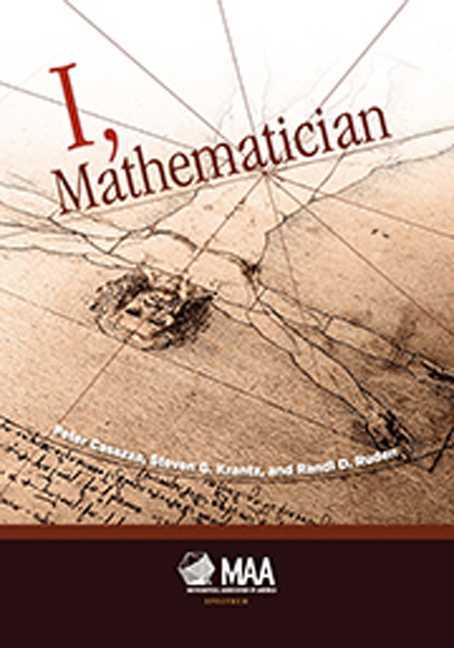Book contents
- Frontmatter
- Contents
- Preface
- Part 1 Who Are Mathematicians?
- Foreword to Who Are Mathematicians?
- 1 Mathematicians and Mathematics
- 2 What Are Mathematicians Really Like? Observations of a Spouse
- 3 Mathematics: Art and Science
- 4 A Mathematician's Survival Guide
- 5 We Are Different
- 6 The Naked Lecturer
- 7 Through a Glass Darkly
- 8 What's a Nice Guy Like Me Doing in a Place Like This?
- 9 A Mathematician's Eye View
- 10 I am a Mathematician
- Part II On Becoming a Mathematician
- Part III Why I Became a Mathematician
8 - What's a Nice Guy Like Me Doing in a Place Like This?
from Part 1 - Who Are Mathematicians?
- Frontmatter
- Contents
- Preface
- Part 1 Who Are Mathematicians?
- Foreword to Who Are Mathematicians?
- 1 Mathematicians and Mathematics
- 2 What Are Mathematicians Really Like? Observations of a Spouse
- 3 Mathematics: Art and Science
- 4 A Mathematician's Survival Guide
- 5 We Are Different
- 6 The Naked Lecturer
- 7 Through a Glass Darkly
- 8 What's a Nice Guy Like Me Doing in a Place Like This?
- 9 A Mathematician's Eye View
- 10 I am a Mathematician
- Part II On Becoming a Mathematician
- Part III Why I Became a Mathematician
Summary
Unlike most of the authors in this collection, I'm not actively in the business of proving theorems, and I haven't been for quite some time. That's one reason for the title of this piece. In fact, my primary home is in a school of education. That's another reason. How could someone trained as a mathematician wind up in mathematics education—and not only love it there, but feel good about it and hope to induce other mathematicians to make the trip?
The journey wasn't always smooth. Moving into educational territory includes a shift in identity, which can be difficult for those of us who have been raised to think of mathematics as the most exalted intellectual enterprise available to humankind, and to think of education as something less than fully worthy.
My goals for this essay are to indicate two things. First, there is a very important role for mathematicians to play with regard to mathematics education, at any point in their careers. Second, while it can feel truly traumatic to “leave the faith,” it is possible to find pathways in educational research that are every bit as challenging and intellectually rewarding as those in mathematics research—with the bonus that one has the opportunity to make a significant difference in the real world.
In the Beginning
I got my Ph.D. from Stanford (in topology and measure theory, not that the details matter at this point) in 1973. My wife was a couple of years behind me, so I took a position as a lecturer at U.C. Davis while she finished up. I had great fun doing mathematics those two years. Admittedly, there was a slight feeling of guilt: being paid for doing something I liked doing so much was sort of like being paid for doing New York Times crossword puzzles. At the same time, I truly enjoyed my teaching: my teaching ratings were close to those of colleagues who had won campus-wide distinguished teaching awards.
Interestingly, that appeared to be a problem. Despite having published a fair number of papers, I was told by more senior colleagues that I risked being viewed as “just a teacher” if I paid too much attention to my teaching. Some advised me to skip my office hours and go home to prove more theorems. That's what would establish my career.
- Type
- Chapter
- Information
- I, Mathematician , pp. 86 - 102Publisher: Mathematical Association of AmericaPrint publication year: 2015

